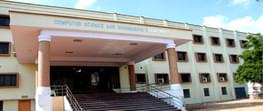Dr. A Sudhakar is the Head of the Department of Electrical and Electronics Engineering at MLR Institute of Technology. He holds a B.Tech., an M.Tech., and a PhD. With over 13 years of experience, Dr. Sudhakar has worked in both academia and industry. He has 52 papers published in both national and international journals and has published a book titled DTC of AC Drives with Intelligent Controllers, published by Lambert Academic Publishing House.

In your 13+ years of experience, what are the special practices at the MLRIT institution that you observed and you would like to highlight?
The active learning strategies implemented by the faculty of MLRIT create interest and motivate the students towards academics. The excellent support provided by the Placement and Training team also nurtures the students. They receive training and understand what is expected of them by the industry. The college is ready to support them in getting placed in top companies with good salary packages.
Technology is going through a lot of dynamic changes these days, what steps are you taking in order to be updated with the latest trends and incorporate them into the curriculum at MLRIT?
We organise workshops and hands-on training programs on the latest trends in engineering. Additionally, we make it a point to include advanced courses like digital control systems, soft computing techniques, advanced electric drives, and advanced control systems. We also have professional electives and interdisciplinary courses like Core Java Programming, Machine Learning, Cloud Computing, and Mobile App Development as open electives in the curriculum for students.
What are the current biggest challenges in the field of Electrical and Electronics Engineering domain in general, and how do you plan to address them as a HOD?
Lack of awareness among students regarding the scope of Electrical and Electronics Engineering opportunities in both software and core sector jobs is a major challenge for us. To address this, we have guidance sessions planned by the faculty and with experts to explain the abundant opportunities available in the latest technologies like Electric vehicles, and solar power generation.
How do you collaborate with industries and other academic institutions to provide practical exposure and internships for your students?
The college has MOUs with industry professionals and corporations. We also have faculty support for students to guide and advise them regarding industry Internships and placements. All our students complete an industry internship of six months as their final year projects in reputed industries like HBL Power Systems, Pinnacle Generators, Bridge IOT Things, and B.S. Power Solutions.
Check MLR Institute of Technology Courses & Fees
Can you explain us about the infrastructural facilities available with respect to Electrical and Electronics department at MLRIT?
The college has several well-equipped laboratories to implement experiments as per the curriculum. These laboratories are also filled with state-of-the-art equipment. We have put in digital classroom facilities that enable us to implement different active learning strategies and to organise student seminars regularly. There is also a project laboratory provided with equipment and computer facilities to support students to do micro-projects and major projects.
You are an individual who is actively involved into research and publications. How do you promote the culture if research activities among students?
We highly encourage our final year students to publish their project work as research papers in Scopus Indexed journals, and reputed conferences and file patents through the college IPFC cells. These publications will not only help us advertise our expertise in educating students but also show our student’s knowledge and skills.
We can observe many students opting for specializations like CSE more, compared to core branches. What is the scope of Electrical and Electronics engineering in the coming years both domestically and internationally?
The scope of Electrical and Electronics Engineering is very broad compared to all other Engineering disciplines. The students completing the B.Tech. in Electrical and Electronics Engineering course are eligible to work in software companies and in circuit branches as well. Rapid development has been observed recently in the electric vehicle industry, solar power generation, and semiconductor manufacturing companies, resulting in more jobs for Electrical Engineering graduates in the coming years.
What is your vision as a HOD of Electrical and Electronics engineering for the coming years at MLRIT?
My vision is to increase the engagement of the students by encouraging them to do micro-projects or mini-projects. The confidence of the students must also be improved by motivating them to give seminars and participate in competitions. The quality of the students has to be maintained by monitoring their academic performance. The standard of the students can be improved by guiding them towards research papers, publications, and patents.








.png?h=16&w=16&mode=stretch)




![IIT Hyderabad - Indian Institute of Technology - [IITH]](https://image-static.collegedunia.com/public/college_data/images/appImage/1485941210cvr1.png?h=111.44&w=263&mode=stretch)

![International Institute of Information Technology - [IIIT]](https://image-static.collegedunia.com/public/college_data/images/appImage/25357_00.jpg?h=111.44&w=263&mode=stretch)

![Birla Institute of Technology and Science - [BITS]](https://image-static.collegedunia.com/public/college_data/images/appImage/28467_BITSH_New.png?h=111.44&w=263&mode=stretch)



![ICFAI Foundation for Higher Education - [IFHE]](https://image-static.collegedunia.com/public/college_data/images/appImage/150408804525355IFHENew.jpg?h=111.44&w=263&mode=stretch)

![University College of Engineering, Osmania University - [UCE]](https://image-static.collegedunia.com/public/college_data/images/appImage/24550_UCE_New.jpg?h=111.44&w=263&mode=stretch)
.png?h=42.55&w=42.98&mode=stretch)

















.jpeg?h=72&w=72&mode=stretch)
.jpeg?h=72&w=72&mode=stretch)

.png?h=72&w=72&mode=stretch)
.png?h=72&w=72&mode=stretch)
.png?h=72&w=72&mode=stretch)

![St Martin's Engineering College - [SMEC]](https://image-static.collegedunia.com/public/college_data/images/logos/16281544911593447928Logo.jpg?h=72&w=72&mode=stretch)
![Mahatma Gandhi Institute of Technology - [MGIT]](https://image-static.collegedunia.com/public/college_data/images/logos/1659754149logo2.png?h=72&w=72&mode=stretch)
![Institute of Aeronautical Engineering - [IARE]](https://image-static.collegedunia.com/public/college_data/images/logos/1685954579Screenshotfrom20230605135953.png?h=72&w=72&mode=stretch)
![Vardhaman College of Engineering - [VCE]](https://image-static.collegedunia.com/public/college_data/images/logos/1642160809logo.png?h=72&w=72&mode=stretch)
![Gokaraju Rangaraju Institute of Engineering and Technology - [GRIET]](https://image-static.collegedunia.com/public/college_data/images/logos/1481803864col28052.jpg?h=72&w=72&mode=stretch)
![BV Raju Institute of Technology - [BVRIT]](https://image-static.collegedunia.com/public/college_data/images/logos/1716524522bvritlogo.png?h=72&w=72&mode=stretch)
![Hyderabad Institute of Technology and Management - [HITAM]](https://image-static.collegedunia.com/public/college_data/images/logos/1601450056Logo.jpg?h=72&w=72&mode=stretch)
![CMR Engineering College - [CMREC]](https://image-static.collegedunia.com/public/college_data/images/logos/1593438888Logo.jpg?h=72&w=72&mode=stretch)
![Vignana Bharathi Institute of Technology - [VBIT]](https://image-static.collegedunia.com/public/college_data/images/logos/149526397614819801430.jpg?h=72&w=72&mode=stretch)
![Geethanjali College of Engineering and Technology - [GCET] Keesara](https://image-static.collegedunia.com/public/college_data/images/logos/16860356593131894094954175992676362983714743865833242n.jpeg?h=72&w=72&mode=stretch)
![Sreenidhi Institute of Science and Technology - [SNIST]](https://image-static.collegedunia.com/public/college_data/images/logos/1652251888logo8080jpg01.jpg?h=72&w=72&mode=stretch)
![CMR Technical Campus - [CMRTC]](https://image-static.collegedunia.com/public/college_data/images/logos/1593073367Logo.png?h=72&w=72&mode=stretch)
![Malla Reddy Engineering College - [MREC]](https://image-static.collegedunia.com/public/college_data/images/logos/1599898758Logo.png?h=72&w=72&mode=stretch)
![Marri Laxman Reddy Institute of Technology & Management - [MLRITM]](https://image-static.collegedunia.com/public/college_data/images/logos/1662453125Screenshot20220906140129.png?h=72&w=72&mode=stretch)
![Vidya Jyothi Institute of Technology - [VJIT]](https://image-static.collegedunia.com/public/college_data/images/logos/1754139535Screenshot20250802182838.png?h=72&w=72&mode=stretch)
![CMR College of Engineering & Technology - [CMRCET]](https://image-static.collegedunia.com/public/college_data/images/logos/1661322119index.jpg?h=72&w=72&mode=stretch)



Comments